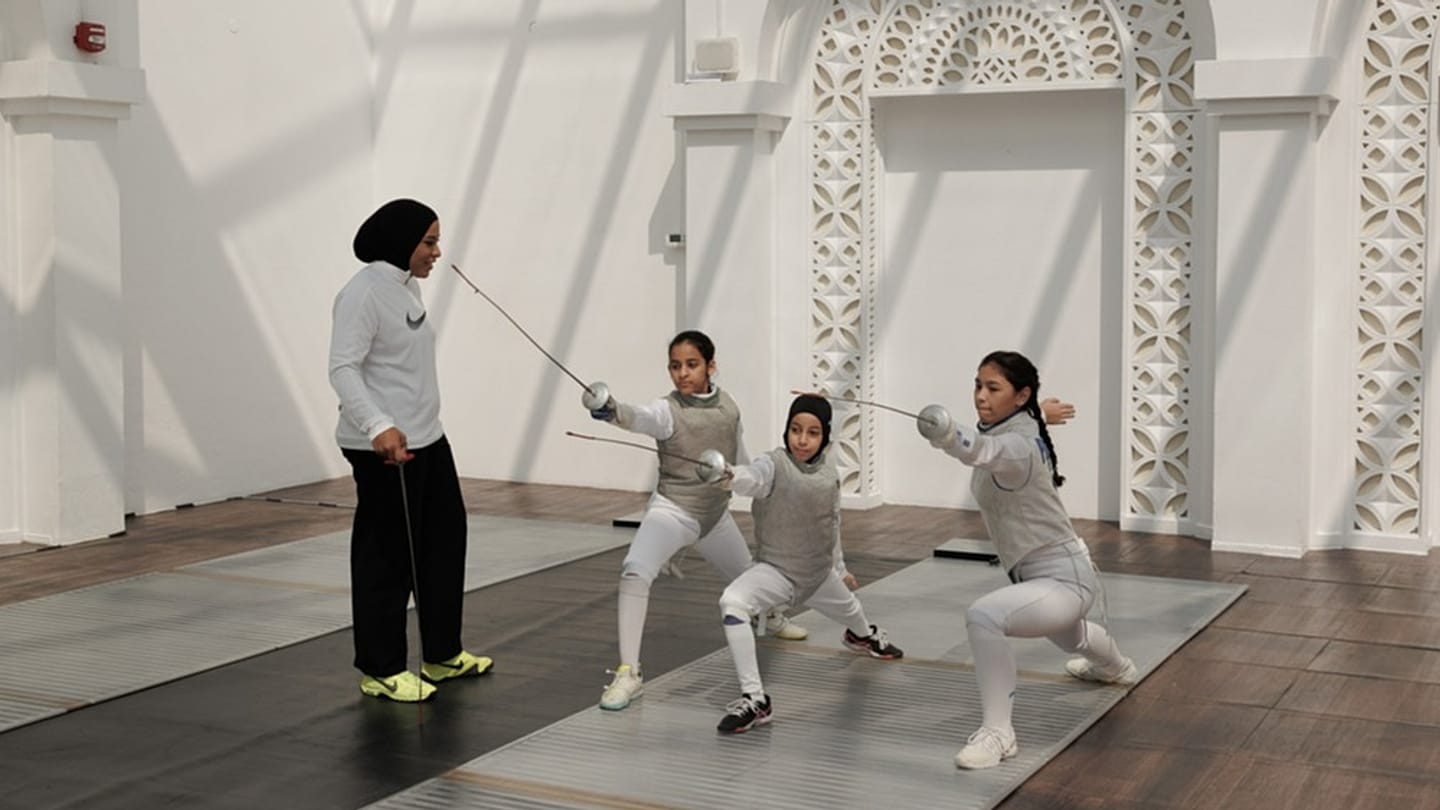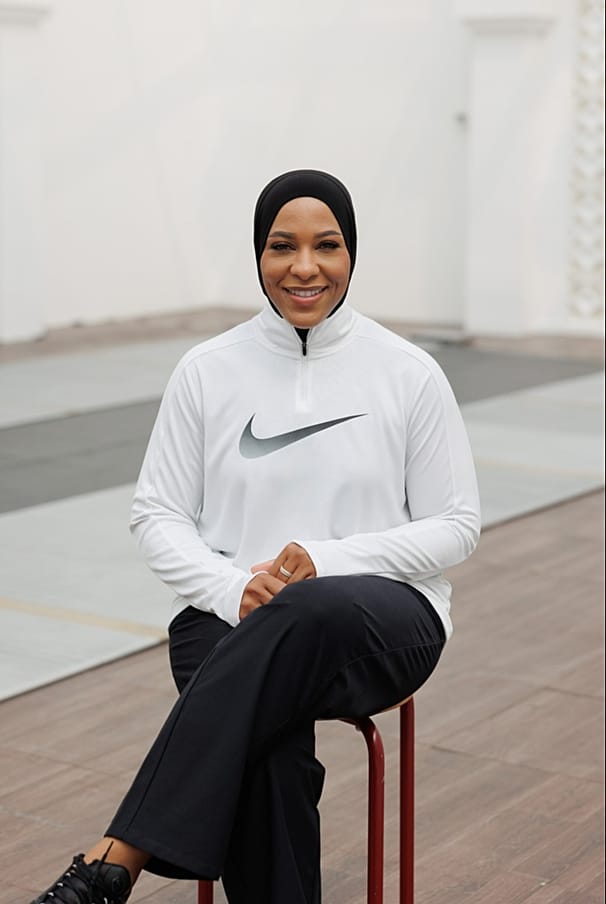
US Olympic fencing medalist Ibtihaj Muhammad made history as the first American Muslim woman to wear a hijab in Olympic competition. Now in Doha as an ambassador for Qatar Foundation’s Creating Pathways programme, she’s helping young girls discover confidence, courage, and purpose through her sport.
Euronews correspondent Aadel Haleem sat down with Muhammad to talk about how sport can empower the next generation of girls and why, as she puts it, “I love that sport gave me the opportunity to be myself.”
Ibtihaj, you’re teaming up with Qatar Foundation’s Creating Pathways programme. What excites you the most about introducing fencing to young girls in Qatar?
Ibtihaj Muhammad: I’ve grown up fencing my entire life and I love what sport teaches you and I’m excited for Qatari girls to be introduced to the sport of fencing because it’s so uniquely accommodating to our faith as Muslims, in terms of the modest dress.
But fencing, in particular, is a special sport because you incorporate speed, athleticism, agility with tough mental focus and strategy that you may not get in other sports.
When you see these girls pick up a sabre for the first time, what is it about your own journey that you hope inspires them?
IM: One thing about sport that I’ve always loved is the ability to dream big. And when I see these girls pick up foils or sabers or epees for the first time, I can see their wheels turning and envisioning themselves being successful in the fencing strip. And that’s the goal of the Pathways program is to inspire the next generation. To not only lead athletically, whether it be in fencing or track and field or even tennis, but more importantly to be leaders in life and to empower them to take on any challenge that they face as they grow.
You said your faith gave you strength throughout your career. How do you hope your story inspires Muslim girls who may be hesitant to play sports?
IM: Throughout my own journey, I faced a lot of obstacles as a kid who had brown skin in a predominantly white sport and a very visible Muslim, wearing hijab. I love that sport gave me the opportunity to be myself and to discover this power that I had deep-down inside that I had to find, and this, I feel like is something that the girls can also discover for themselves. They’re facing a lot of obstacles, some internal where you have to discover this confidence and self-determination and it’s one of those things once you unlock, the sky’s the limit. And I believe that sport helps kind of expedite that process for the younger generation.

You mentioned the fencing uniform fits with the faith. Can you elaborate?
IM: Fencing historically hasn’t changed much since its birth in 1896. It’s the oldest sport in the Olympic Games… what you see fencers wear, the long white jacket and pants, is what they used to wear back in the late 1800s when they were dueling.
So this modest attire, an intrinsic part of the sport, uniquely accommodates our faith as Muslims and as Muslim women who observe hijab… You don’t find it in very many sports… I just get to be an athlete and have the results speak for themselves. I look forward to the girls in the Creating Pathways programme feeling that same inspiration and really finding their courage on the fencing strip.
What’s one thing parents or teachers can do to better support girls who want to pursue sport seriously?
IM: Parents, teachers, coaches—anyone close to the children—can help make the transition easy… Abandon stereotypes and cultural norms that may discourage girls from participating in sport.
Sport offers so much… not just health benefits, but also confidence, teamwork, and leadership skills… These are essential parts of growing up and are harder to find without sport.
So now you’re here in Doha, what role do you think Qatar and the Middle East can play in shaping women’s sports globally?
IM: I think it sets a very high precedent that Qatar is investing in its girls. They’re investing in the future and the future is female, and we want to support and uplift and kind of mold the next generation to be leaders and I think that sport is such a powerful tool and a powerful vehicle for change.
Qatar Foundation is working not just to create athletes, but an entire ecosystem around women’s sports, from coaches to leaders. What’s the key to keeping this momentum going?
IM: Qatar Foundation is doing such a great job of piggybacking on all these amazing sporting events that are taking place in Qatar. Qatar is leading the region in hosting so many different events from a range of sports. And that momentum is in our favor, especially post-World Cup. When we think about our youth and their next stages and how they view sport, not everyone’s going to the Olympics. Not everyone is competing professionally. But there’s so many different lanes within sport whether it be coaching or officiating or just being involved in sports from a local or like youth level that are essential parts of continuing this tradition of elevating sports especially girls and their involvement in sports to empower the next generation.
From Olympic medallist to mentor, how has your idea of success changed now that you see these girls holding the same sabre that once changed your life?
IM: I’m a competitor down to my core and I’ve always loved winning and I like the thrill of being successful, and so I’ve just kind of redefined what success looks like. It’s not always the trophy or the podium finish. It can be seeing these young girls be inspired and be inspired to try something new, to find confidence in maybe being afraid, where normally they would be afraid to try something new or may feel like they’re going to be judged for trying a sport for the first time. And I just want them to be brave and to take up space, where traditionally there wasn’t space for women, there wasn’t a space for Muslim girls who wear hijab and I just want them know that they are deserving of every opportunity, especially in sport, and if they’re willing to work hard they can fulfill their dreams.